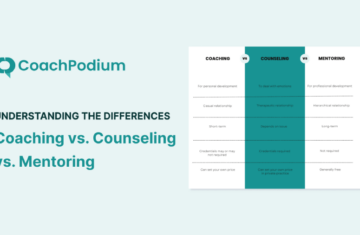Are you looking to enter the life coaching business?
You probably are wondering what a life coach does. Then, you have come to the right place. In this article, you will learn about different types of life coaches along with how to become one yourself.
You’ll be able to choose a life coaching niche for your business at the end of this article. Without further ado, let’s dive into the article, starting with the section, what does a life coach do?
What do Life Coaches do?
As a life coach, you empower clients to identify and achieve their goals. You assist them in setting clear and achievable goals by breaking them down into actionable plans.
You check with your clients regularly to maintain motivation and progress in following through on their commitments. By facilitating self-discovery, you help your client gain insights into their values, strengths and weaknesses.
Moreover, you help build confidence by assisting them in recognizing their unique qualities and capabilities. You help them to combat self-doubt and procrastination. Another work you do is to help with their communication skills to improve personal and professional relationships.
The important task that you perform is to make your client accountable for their commitments and actions.
Life Coaching Niches
Life coaching is a diverse field, specializing in various niches to address different aspects of life. You bring your expertise in other areas of personal and professional development to empower growth.
Here’s a closer look at various types of life coaches, each focusing on specific aspects of life:
1. General Life Coach

You offer insights and strategies to help your client whether they are seeking to improve their relationship, boost their career, or find a life balance.
As a general life coach, you provide guidance across various life areas. You help clients set achievable goals, help them navigate life transitions, and enhance overall well-being.
General life coaching covers the overall life coaching categories. This life coaching is essential to determine which part of your life needs improvement. So that, your client can enhance the weak aspect of their personal and professional life.
Famous coaches like Tracey Ward and Amberly Lago provide life coaching in various niches.
2. Career Coach

You help your clients by guiding them in their professional journeys. You offer strategies to your clients for career development, job transitions, and advancement.
From helping build your client’s personal brand to setting up boundaries for work-life balance, fall under the career coaching niche. You, as a career coach, provide ways to help your client to be more resilient, productive, and focused on the work.
You help them identify the ideal career path, prepare for interviews, and excel in their current job. In short, you help them achieve their career goals.
To name some famous career coaches, Claire Wasserman and Jenny Logullo are professional career coaches.
3. Health and Wellness Coach

As a health and wellness coach, you help improve client’s physical and mental well-being. You provide holistic guidance by addressing exercise, stress management, and lifestyle choices.
In this coaching niche, you analyze the client’s behavior and mental and emotional responses. This analysis lets you prepare effective strategies for your client.
You empower your clients to make healthier choices and enhance their overall well-being, resulting in a healthier and healthier life.
Dr. Mark Hyman and Avishai El are well-known coaches in the health and wellness coaching niche.
4. Nutrition Coach

In this niche, you focus on clients’ dietary habits and nutritional choices. You create a personalized nutrition plan to address their needs and goals. You assist in addressing dietary concerns, managing weight effectively, and adopting healthier eating habits.
You provide invaluable guidance to clients seeking to improve their diet for health reasons or specific fitness goals. You encourage a client to take personal responsibility for their health and well-being through a holistic standpoint.
Some examples of nutrition coaches are Chris and Alexia Tuttle and Cory Ruth.
5. Business Coach

You guide entrepreneurs and business leaders in this niche. By providing strategic guidance for leadership development, you help optimize business performance.
Moreover, you help your clients navigate challenges, whether they are existing business owners or launching a startup. You show them their current position and what they should do to reach where they want to.
You guide your client to define their corporate values and help them align their personal and corporate values.
Some life coaches that offer business coaching are Tony Robbins and Jay Abraham.
6. Financial Coach

As a finance coach, you assist clients in achieving financial wellness. You help them with budgeting, debt management, and setting and achieving financial goals.
You empower your client to take control of their financial future, which leads to financial independence and security. You do this by encouraging them to develop money management skills.
By looking at their financial situation in a holistic way, you help them identify the limiting beliefs that are affecting their financial independence. So that they could tackle their financial issue effectively.
Dave Ramsey and Tammy Lally are among the well-known financial coaches in the market.
7. Relationship Coach

Your specialization in this niche is to nurture healthy interpersonal connections. You provide guidance on improving communication and resolving conflicts to build strong and fulfilling relationships.
As a relationship coach, you work with your client to identify the attitude affecting their relationship. By addressing such attitudes, you help them to improve their relationship.
Your target audience is the clients who are looking to enhance their romantic relationships, family dynamics, or workplace relationships.
John Gottman and Stefan Labossiere are well-known relationship coaches.
8. Communication Coach

The main task is to enhance the communication skills of your client as a communication coach. You help clients to become confident, clear, and influential communicators.
You can help clients excel in public speaking and negotiation or improve their everyday communication.
Communication skills are the base skills that help in various areas of life, such as personal, business, relationships, etc. You are indirectly helping them excel in other aspects of life as well.
Coaches like Dr. Gary Genard and Julian Treasure provide communication coaching.
9. Executive Coach

You work with high-level executives and leaders within organizations. You help them manage complex workplace dynamics by providing leadership development strategies.
The clients seeking an executive coach are often goal-oriented and motivated to advance their careers. You provide a boost in their endeavors.
Moreover, you facilitate personal growth and guide executives in making informed decisions that can positively impact the organization.
Marshall Goldsmith and Jason Treu are among world-renowned executive coaches.
10. Personal Development Coach

As a personal development coach, you empower clients to unlock their full potential. You focus on self-improvement and boosting self-esteem so your client becomes more confident and fulfilled in various life domains.
Whether your client seeks personal growth in career, relationship, or overall well-being, you support them by providing personalized strategies.
As a personal development coach, you work with your clients about their different aspects of life, such as work life, health, interpersonal relationships, communications, etc.
Some of the best personal development coaches worldwide are Brendon Burchard, Tony Robbins, and Adam Tyler Smith.
11. Spiritual Coach

Under this niche, you support your clients on their spiritual journeys. You assist in exploring and deepening spiritual beliefs and practices to find meaning and purpose in life.
You offer guidance on mindfulness, meditation, and spiritual growth to enable clients to connect with their inner selves.
As a spiritual coach, you can help clients overcome past traumas and negativities. Some examples are dealing with negative self-criticism, finding joy and thankfulness, etc.
The primary objective of spiritual coaching is to guide your client to find inner peace.
Coaches like Erica Carrico and Bernadette Logue provide spiritual coaching services.
12. Creativity Coach

You, as a creative coach, inspire and nurture creativity in clients who are seeking to tap into their artistic potential. You help clients unlock creative thinking and problem-solving by providing guidance, motivation and techniques.
Being a creativity coach is not easy, as you have to understand how a creative mind works. You have to be familiar with terms like flow state, in which your clients are at their best. Thus, understanding the mindset provides you with a competitive advantage in the market.
Individuals who work in a creative field, such as artists, writers, etc., are your target audience.
Danielle Raine and Jay Alders are well-known creativity coaches.
13. Fitness Coach

You specialize in the physical well-being aspect of life as a fitness coach. You design custom workout plans and offer motivation to help clients reach their fitness goals.
You provide personalized exercise routines and nutrition advice to achieve your client’s fitness goals, such as weight loss, muscle gain, or overall health improvement.
As a fitness coach, you guide clients to set long-term goals to improve overall health and fitness levels.
However, you can also help them with stress management and healthy eating habits.
Coaches like Tracy Anderson and Brett Hoebel offer fitness coaching.
14. Performance Coach

You aid individuals in enhancing performance in any field where your client desires peak performance, such as sports, music, public speaking, etc. You provide custom strategies to achieve that goal.
In performance coaching, the client identifies their strengths and the areas where they need to improve with your help.
As a performance coach, you help your clients to challenge the need-to-improve areas that affect their performance. You guide them to develop skills such as resilience, communication and innovation.
Famous coaches like Mel Robbins and Brendon Burchard provide performance coaching.
15. Recovery Coach

As a recovery coach, you play a significant role in helping your client overcome addiction and maintain sobriety. You offer guidance, accountability, and continuous support throughout the recovery and help clients build healthier and substance-free lives.
In this coaching niche, you help your client overcome their addiction, considering long-term benefits. That is actually a major difference between a recovery coach and a therapist.
Addiction may be of different types, such as food addiction, gambling addiction, gaming addiction, shopping addiction, etc. Your aim is to take your client out of such addiction.
Tommy Rosen and David Malow work as recovery coaches.
How Do You Choose a Life Coaching Niche for Your Business?
Selecting the right life coaching niche is a significant decision that can shape the success and satisfaction of your coaching practice. It’s essential to align your passions, expertise and the needs of your target clients.
Here’s a step-by-step guide on how to choose the perfect life coaching niche for your business:
Self-Assessment
Begin by assessing your interests, strengths, and personal experiences. Reflect on what truly excites you and where you have a natural inclination. Your niche should align with your genuine enthusiasm and expertise.
Market Research and Consult a Mentor
Research the coaching market to identify trends, demands, and opportunities. Consult with experienced coaches or mentors who can provide insights into market dynamics and niche selection. Look for gaps in the market where your unique skills and interests can meet the needs of potential clients.
Client Needs
Consider the needs and aspirations of your potential clients. Who are they, and what challenges are they facing? Your niche should directly address these needs and offer solutions that resonate with your target audience.
Passion and Expertise
Choose a niche you are genuinely passionate about and have expertise in. If your passion aligns with a cause, incorporating it into your niche can add authenticity and depth to your coaching practice.
Market Potential
Assess the market potential of your chosen niche. Is there a sufficient client base, and are they willing to invest in coaching services? Ensure there is a viable market for your niche.
Alignment with Values
Ensure that your chosen niche aligns with your personal values and coaching philosophy. Coaching is most effective when authentic and aligned with your core beliefs.
Competitive Landscape
Analyze the competition within your chosen niche. Understand who your competitors are, their strengths and weaknesses, and how you can differentiate yourself by offering a unique approach or specialization.
Training and Certification
If your chosen niche requires specific training or certification, be ready to invest in your education. This process adds credibility to your practice and ensures you are well-equipped to serve your clients.
Pilot Programs
Before fully committing to your niche, consider offering pilot programs or free sessions to gauge interest and gather testimonials. This approach can help you fine-tune your niche and build initial clientele.
Final Thoughts
Life coaching has a broad category that deals with the various aspects of life. Consider the unique characteristics of each life coaching niche. Then, select the one that resonates with you by taking different factors into account.
However, you don’t have to stick with one niche, and you can test and try different niches and create your business with combinations you like.
Moreover, you get to know about the process of becoming a life coach in this article.
If you want to learn more about becoming a life coach, you can read an article: How to Start a Successful Life Coaching Business?
FAQs
Who can become a life coach?
Anyone with the passion and dedication to help others and improve their lives can become a life coach.
What are the most sought-after and profitable life coaching niche?
The most sought-after and profitable life coaching niches are general life coaching, career, relationship, executive and personal development coaching.
Do you need any certification or education to become a life coach?
No formal certification or specific educational requirements are mandatory to become a life coach. However, you can get life coach certification to gain expertise in your niche.
What skills do life coaches need?
To become a successful life coach, you require a range of skills, including communication, empathy, problem-solving, and time management.
How long does it take to become a certified life coach?
The duration of becoming a certified life coach can vary depending on the program and your pace of learning. Generally, completing a life coaching certification program can take anywhere from a few months to a year or more.



